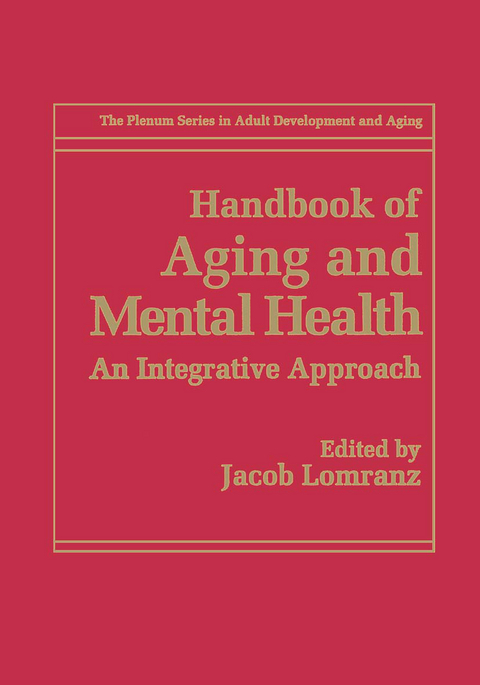
Handbook of Aging and Mental Health
Springer-Verlag New York Inc.
978-1-4899-0100-2 (ISBN)
Data accumulated more rapidly by remaining within familiar frarnes of reference and relying on farniliar designs and mea- sures. The new gerontologists soon harvested a promising crop of descriptive findings. Within a decade after the establishment of the Gerontological Society of America (1947), it was possible to discern the outlines of a valuable new field of knowledge.
Introduction: Toward Theories in Mental Health and Aging.- I. Well-Being, Adjustment, and Growth Behaviors in Later Life.- 1. Declarative and Differential Aspects of Subjective Well-Being and Its Implications for Mental Health in Later Life.- 2. Control: Cognitive and Motivational Implications.- 3. Resilience in Adulthood and Later Life: Defining Features and Dynamic Processes.- II. Stress, Coping, and Mental Health.- 4. Toward a Developmentally Informed Theory of Mental Disorder in Older Adults.- 5. Conservation of Resources, Stress, and Aging: Why Do Some Slide and Some Spring?.- 6. War Trauma and the Aged: An Israeli Perspective.- 7. Toward a Temporal—Spatial Model of Cumulative Life Stress: Placing Late-Life Stress Effects in a Life-Course Perspective.- III. The Adult Developing Self.- 8. The Double Voice of the Third Age: Splitting the Speaking Self as an Adaptive Strategy in Later Life.- 9. Epistemology, Expectation, and Aging: A Developmental Analysis of the Gerontological Curriculum.- 10. An Image of Aging and the Concept of Aintegration: Coping and Mental Health Implications.- IV. Psychodynamics and Psychopathology in Later Life.- 11. Psychoanalysis, the Life Story, and Aging: Creating New Meanings within Narratives of Lived Experience.- 12. The Psychoimmune System in Later Life: The Problem of the Late-Onset Disorders.- 13. Uses of the Past in Adult Psychological Health: Objective, Historical, and Narrative Realities.- V. The Family in Later Life.- 14. Perspectives on the Family and Stress in Late Life.- 15. A Frame of Reference for Guiding Research Regarding the Relationship between Adult Attachment and Mental Health in Aging Families.- 16. Multigenerational Families and Mental Illness in Late Life.- 17. Cross-Cultural Perspective on Attitudes toward FamilyResponsibility and Well-Being in Later Years.- VI. Memory and Dementia.- 18. The Significance of Memory Complaints in Later Life: Methodological and Theoretical Considerations.- 19. Age-Related Cognitive Decline and the Dementia Threshold.- 20. Education and Dementia.- VII. Depression and Aging.- 21. Depression as a Pivotal Component in Secondary Aging: Opportunities for Research, Treatment, and Prevention.- 22. The Variability of Depression in Old Age: Narrative as an Integrative Construct.- 23. Aging and Behavioral Medicine: A Triaxial Model.- Epilogue: Future Perspectives.
| Reihe/Serie | The Springer Series in Adult Development and Aging |
|---|---|
| Zusatzinfo | XIX, 539 p. |
| Verlagsort | New York |
| Sprache | englisch |
| Maße | 178 x 254 mm |
| Themenwelt | Medizin / Pharmazie ► Medizinische Fachgebiete ► Psychiatrie / Psychotherapie |
| ISBN-10 | 1-4899-0100-0 / 1489901000 |
| ISBN-13 | 978-1-4899-0100-2 / 9781489901002 |
| Zustand | Neuware |
| Haben Sie eine Frage zum Produkt? |
aus dem Bereich


